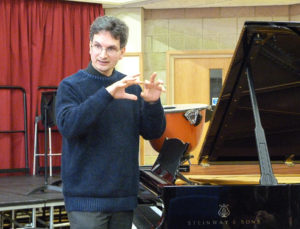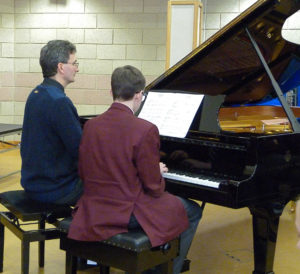Things I learned from my teaching at the Guildhall School of Music

Along with my University degree, I studied performance at the GSMD, where I completed the Licentiate and Associate diplomas. My first teacher was a very fine concert pianist, who was a brilliant and inspiring player, but he was not able to help me very much with technique, as it all just came naturally to him. Following that, I studied for a year with the head of piano at the GSMD, a gifted player and teacher and who was more able to teach technique. He was a lovely man and a fine teacher. He used to cover my music with marks like bow marks. A down bow mark meant let your wrist fall on those notes and an up bow meant play with an upward moving wrist. The effect of these movements was that you got the right stresses and releases on chords and it really helped with dynamics and phrasing.
One interesting thing about my piano studies at the Guildhall, was my introduction to Alexander Technique. Alexander was a professional actor who kept losing his voice and realised that it was because he was using his vocal chords badly. He sat for hours in front of a mirror examining how he used his body and he discovered that he was far too tense and using muscles that didn’t need to be used. He developed the Alexander Technique and started teaching professionals how to use their bodies well. He discovered that most excessive tension started with the neck pulling into itself and tightening up.
All piano students at the Guildhall, were given short sessions with the A.T. teacher and it was especially interesting to find that she was a concert pianist. One difficulty that I was experiencing at that time was struggling to play quickly and playing with too much tension. I was trying too hard and becoming very rigid; starting at the neck and continuing down my arms to the wrists. The teacher would very gently place her hands on my chin and neck and demonstrate that as I started to play the piano, I would set my neck and pull my chin down. It was totally unnecessary but had become a fixed habit. We worked hard (or should I say tried not to work so hard) at the piano for several weeks until one day I had an amazing breakthrough: I started to play the opus. 22 Beethoven Sonata without setting my neck and my fingers flew away with such rapidity and ease that it both shocked and thrilled me. It was like I had been released from a strait-jacket and my fingers had been set free. I became aware of my finger tips rather than my arms and wrists. Such was the transformation, that I started planning to have piano lessons with this teacher and indeed ended up spending two whole years with her.
These piano lessons were fun and I was taught many helpful things that I use all the time in my own teaching and performing. My new teacher was called Nelly Ben-Or. She was full of energy and set about releasing the potential that she saw in me. Five things come to mind when I think of what she passed on to me:

- As described above, I learnt how to play with ‘alive’ finger tips and no excessive tension, enabling me to play with great speed and clarity.
- She taught me to approach difficult passages in a different way (with more thinking and less repetitive practice; trying regrouping the notes; looking for hand positions).
- She taught me how to memorise a piece of music while away from the piano, by seeking to understand the music from a harmonic point of view (which also helped greatly with interpretation).
- Since I had always felt like my playing was shallow and lacking in conviction, perhaps the most satisfying thing was learning how to play a beautiful melody from my heart and truly express myself through the music.
- Very closely coupled to the above point, was learning how to listen acutely to the sounds I was producing. I believe that learning to listen is a progressive thing and I am much further down that path now, but still learning. After hearing a young prodigy perform, the esteemed teacher Leschetitsky, was asked if he could teach him anything. The great man said, “I can teach him how to listen!”
(TO BE CONTINUED)